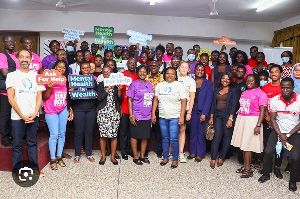People living in communities affected by activities of illegal miners popularly known as “galamsey”, are in support of the restoration of the degraded lands, but not willing to pay for the cost.
According to a research conducted in three of such communities, by the Forestry Research Institute of Ghana of the Council for Scientific and Industrial Research (CSIR-FORIG), the locals were of the view that it was important to restore the mined sites but not at their expense.
They argued that the main perpetrators and beneficiaries of the illegal mining activities came from outside the communities including; foreigners, hence it was unfair for them to bear the cost of the reclamation.
The research, which was conducted in Ntakam, Asawinso and Nkatie in the Western North Region, was among other objectives, to test the survival of biodiversity on the mined sites and the suitability of selected tree species for the reclamation exercise.
It also sought to provide a science-based resource for educating landowners, foresters, and the public on techniques appropriate for restoration of degraded mined sites.
Dr Beatrice Darko Obiri, a Principal Research Scientist at CSIR-FORIG who presented the findings of the research at a symposium at Fumesua, said most respondents embraced the idea of reclaiming the degraded lands, but were quick to reject the financial responsibility.
She said 61.7 per cent of the respondents confirmed that their farms were close to mining sites, with 58.3 per cent having one to three members of their households involved in galamsey.
“The restoration of galamsey-degraded lands in Ghana is possible if a bottom-up approach is adopted, where local communities are put at the centre of affairs and made to own the restoration processes” she opined.
She stated that “The feasibility and opportunities of market-based incentive mechanisms, such as payment for ecosystem services should be explored further; and it is also important to focus on sensitisation programmes that appeal to the conscience and attitudes towards the holistic importance of forest”.
Dr Darko Obiri said galamsey was hazardous to lives and the environment but a lucrative source of livelihood in endemic communities.
The ban placed on the “illegal business”, she noted, worked in the short term but needed to be intensified as many displaced miners without any meaningful alternative jobs, could go back into galamsey.
Regional News of Wednesday, 6 November 2019
Source: ghananewsagency.org

















